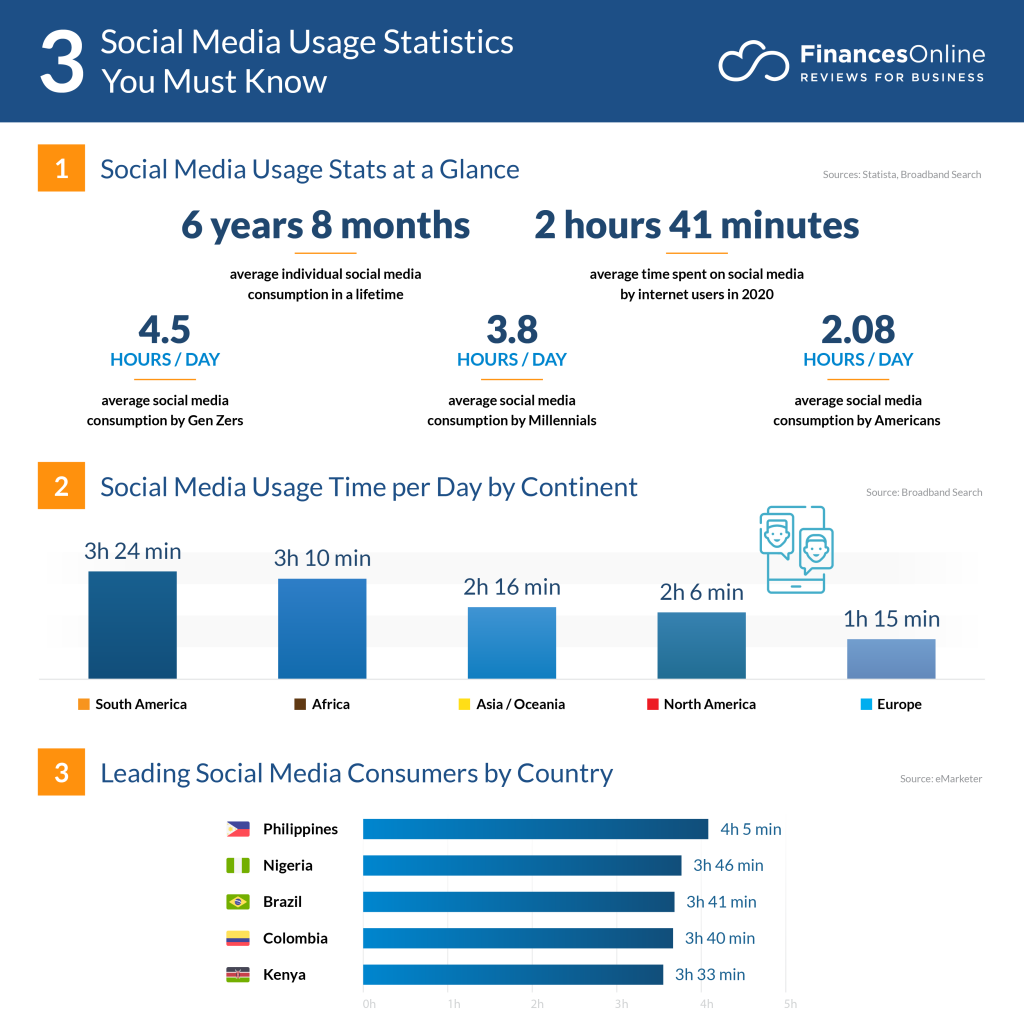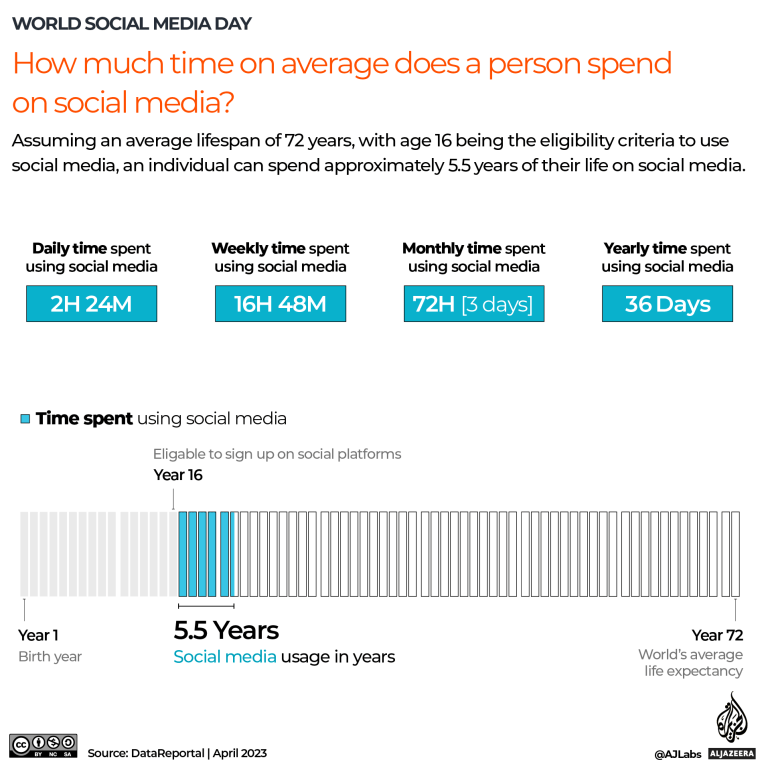Two hours of social media use per day is considered healthy. Excessive use can lead to negative mental health effects.
Social media has become an integral part of daily life. Many people spend hours scrolling through feeds, liking posts, and engaging with content. While social media can provide valuable connections and information, overuse can be detrimental. Studies suggest that two hours per day is a balanced amount.
This limit helps maintain mental well-being and prevents issues like anxiety and depression. It is essential to be mindful of screen time and prioritize real-life interactions. Setting boundaries for social media use can improve overall quality of life. Remember, moderation is key to enjoying the benefits without the drawbacks.
Impact Of Social Media On Mental Health
Social media is a big part of our lives. It connects us with friends and family. But it also affects our mental health. How much time is too much? What are the effects on our minds? Let’s explore.
Emotional Well-being
Using social media can make us feel happy. We see fun posts, cute pictures, and funny videos. But too much time online can also hurt our emotional well-being.
- Seeing friends’ perfect lives can make us feel bad.
- We might feel left out or lonely.
- Reading sad news can make us feel sad too.
Finding a balance is important. Spend some time online, but not too much.
Anxiety And Depression
Too much social media can cause anxiety. We might worry about likes and comments. This can make us feel stressed.
| Issue | Effect |
|---|---|
| Worrying about likes | Increases anxiety |
| Reading bad news | Causes depression |
| Seeing perfect lives | Creates jealousy |
Social media can also lead to depression. Comparing ourselves to others can make us feel bad. Remember, people only show their best moments online. It’s not the whole picture.
- Limit your social media time.
- Unfollow accounts that make you feel bad.
- Focus on real-life connections.
Taking these steps can help improve your mental health. Stay happy and healthy!

Credit: financesonline.com
Physical Health Considerations
Social media use impacts our physical health. Too much screen time can lead to various health issues. Let’s explore some of the key physical health considerations.
Sleep Disruption
Using social media before bed can disrupt sleep. The blue light from screens tricks our brains, making it hard to fall asleep.
Experts recommend avoiding screens at least one hour before bed. This helps signal to your brain that it’s time to rest.
Eye Strain And Fatigue
Staring at screens for long periods causes eye strain. Symptoms include headaches, dry eyes, and blurred vision.
To reduce eye strain, follow the 20-20-20 rule. Every 20 minutes, look at something 20 feet away for 20 seconds.
Also, adjust your screen brightness and take frequent breaks. This helps keep your eyes healthy and reduces fatigue.
Recommended Daily Social Media Usage
Balancing social media usage is crucial for mental health. Experts suggest limiting screen time to about 1-2 hours daily. Prioritize real-life interactions and hobbies to maintain well-being.
Expert Opinions
Experts suggest daily social media usage should be limited to maintain mental well-being.
Age-specific Guidelines
Children: 1-2 hours, Teens: 2-3 hours, Adults: less than 2 hours.
Balancing Social Media And Real Life
Social media is part of our daily lives. But too much time online can hurt our health. Balancing social media and real life is important. It helps keep us happy and healthy.
Quality Time Offline
Spending time offline is key. It helps our minds and bodies relax. Here are some ways to enjoy quality time offline:
- Play a sport or exercise
- Read a book
- Spend time with family and friends
- Enjoy nature
- Learn a new hobby
These activities can make you feel better. They also help you stay connected with the real world.
Digital Detox Strategies
Taking a break from social media is healthy. It can help you feel less stressed. Here are some digital detox strategies:
- Set specific times for social media use
- Turn off notifications
- Use apps that limit screen time
- Have device-free meals
- Unfollow accounts that make you feel bad
These strategies can help you reduce your screen time. They can also improve your mood and well-being.
Benefits Of Limited Social Media Use
Limiting social media use can have numerous benefits for your well-being. Spending less time on social media allows you to focus better, improve relationships, and more.
Enhanced Focus
Reduced social media use helps you enhance focus. You can concentrate better on tasks. Distractions decrease and productivity rises.
- More time for hobbies
- Improved work performance
- Better study habits
Less screen time means fewer distractions. Your mind stays clearer and more alert.
Improved Relationships
Spending less time online improves relationships. You can talk more with family and friends.
- More face-to-face conversations
- Deeper connections
- Better understanding of loved ones
Talking in person builds stronger bonds. It helps you connect on a deeper level.
Recognizing Signs Of Overuse
Understanding the signs of social media overuse is essential. It helps maintain a healthy balance. Overuse can lead to various problems. Recognizing these signs early can prevent long-term issues.
Behavioral Changes
Excessive social media use often leads to noticeable behavioral changes. These can impact your daily life. Watch for these common signs:
- Increased irritability when offline
- Neglecting responsibilities
- Reduced interest in hobbies
- Frequent mood swings
These changes suggest a dependency on social media. It is important to monitor and adjust usage.
Physical Symptoms
Overuse of social media can also cause physical symptoms. These can affect your overall health. Common symptoms include:
| Symptom | Description |
|---|---|
| Eye Strain | Dry, itchy, or tired eyes |
| Sleep Disruption | Difficulty falling asleep |
| Neck Pain | Discomfort from poor posture |
| Headaches | Frequent headaches from screen time |
These symptoms indicate it’s time to take a break. Reducing screen time can help alleviate these issues.
Healthy Social Media Habits
Maintaining healthy social media habits is crucial for mental well-being. Excessive use can lead to stress and anxiety. But, balanced usage can enhance connections and learning.
Setting Boundaries
Setting boundaries is essential for healthy social media use. Allocate specific times for social media. Avoid using it during meals or bedtime. This helps reduce screen time and improves focus.
| Time of Day | Action |
|---|---|
| Morning | Limit to 30 minutes |
| Afternoon | Take a short break |
| Evening | Limit to 1 hour |
Mindful Consumption
Mindful consumption involves being aware of what you view. Follow positive content that adds value to your life. Avoid accounts that cause stress or negativity.
- Follow inspiring accounts
- Engage in meaningful conversations
- Unfollow toxic profiles
Mindfulness helps you enjoy social media without feeling overwhelmed. Use social media to learn and grow. Remember, quality over quantity.

Credit: www.digitalinformationworld.com
Tools And Apps For Managing Screen Time
In today’s digital age, managing screen time is crucial for our well-being. Luckily, various tools and apps help us monitor and control our social media usage. These digital solutions are designed to foster healthier habits.
Usage Tracking
Usage tracking tools offer insights into how much time you spend on social media. These apps help you understand your digital habits better.
- Screen Time (iOS): This built-in app tracks your device usage. It shows daily and weekly reports.
- Digital Wellbeing (Android): This app provides data on your screen time. It also offers ways to reduce it.
- RescueTime: This app tracks time spent on various apps and websites. It provides detailed reports and insights.
Content Filters
Content filters help you control what you see on social media. These tools can block distracting or harmful content, ensuring a safer online experience.
- Freedom: This app blocks distracting websites and apps. You can set a schedule for focused work.
- StayFocusd: A Chrome extension that limits time on distracting websites. Set daily limits for specific sites.
- Cold Turkey: This app blocks apps and websites. It helps you stay focused and productive.
| Tool/App | Platform | Key Features |
|---|---|---|
| Screen Time | iOS | Tracks device usage, daily/weekly reports |
| Digital Wellbeing | Android | Provides screen time data, reduction tools |
| RescueTime | iOS, Android, Desktop | Tracks time, detailed reports |
| Freedom | iOS, Android, Desktop | Blocks distracting sites/apps, schedule setting |
| StayFocusd | Chrome Extension | Limits time on sites, daily limits |
| Cold Turkey | Desktop | Blocks apps/sites, boosts productivity |

Credit: www.aljazeera.com
Frequently Asked Questions
How Many Hours On Social Media Is Healthy?
Experts recommend limiting social media use to 30 minutes to 2 hours per day for better mental health. Excessive use can impact well-being.
How Long Should You Stay Off Social Media?
Take a break from social media for at least a week. This helps reset your mind and reduces stress.
Does Spending Less Time On Social Media Improve Mental Health?
Reducing social media time can improve mental health by reducing stress and anxiety levels.
How Many Hours A Day Do College Students Spend On Social Media?
College students typically spend around 2 to 3 hours a day on social media. This varies by individual and institution.
Conclusion
Balancing social media use is crucial for mental well-being. Limit your screen time to maintain a healthy lifestyle. Prioritize real-life connections and activities over virtual interactions. Awareness and moderation can lead to more productive and happier days. Stay mindful of your social media habits for a healthier, balanced life.